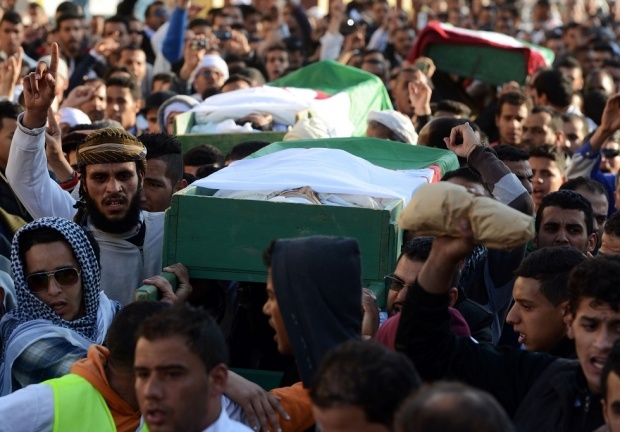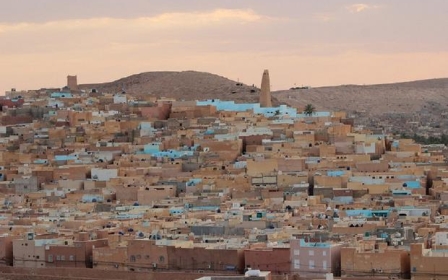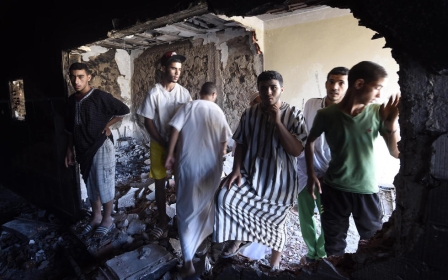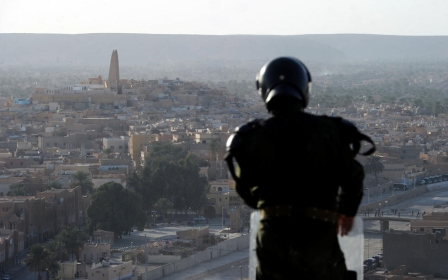Ghardaia detainees: A very 'political' case in Algeria

After violence broke out on 7 July in el-Guerrara near the city of Ghardaia in the Algerian Sahara resulting in the death of 23 people, Kameleddine Fekhar, the founder of the Movement for the Autonomy of M’zab, was taken into provisional custody along with 24 people close to him.
That move quickly led to a petition and support committee demanding their freedom, and hundreds of messages of solidarity were aired in the name of “fighting colonial domination” and supporting “the Amazigh [Berber] cause”.
Fekhar, currently the most controversial activist in Algeria, has not yet been found guilty, but, to quote one Mozabite dignitary, “everything is set for him to become a martyr”.
On 9 July, in the aftermath of the violence in el-Guerrara between Mozabites (Amazigh-speaking adherents to the Ibadi school of Islam) and Arabic-speaking followers of the Maliki approach to Islamic law, the Mozabite activist was arrested. A well-known supporter of the Amazigh cause and the autonomy of the M’zab valley, Fekhar was taken into provisional custody along with 24 other people who were arrested at the same time. He went on hunger strike - which is now on hold - and rallied national and international Berber-supporting and human rights networks.
In a statement released on 25 August, Human Rights Watch (HRW) expressed its concern about the “political” nature of the detention.
“If the government has evidence showing that Kameleddine Fekhar genuinely played a role in this tragic violence and that he is not being held purely because of his strong convictions, then this evidence should be presented at a public hearing,” wrote Sarah Leah Whitson, executive director of the NGO's Middle East and North Africa division. Owing to the absence of such evidence, HRW demands that he be released.
Political decision
Salah Dabouz, one of Fekhar's lawyers and the president of the Algerian Human Rights League, told Middle East Eye: “We have proof that Kameleddine Fekhar is being held for political reasons. On 8 July, President Abdelaziz Bouteflika chaired a meeting on the situation in Ghardaia along with the prime minister, the head of his cabinet and the chief of staff. The next day, the prime minister made a working visit to Ghardaia during which he announced that the people responsible for the crisis had been identified and would be arrested.”
“Yet on the same day, Fekhar, who had heard rumours of his possible arrest, asked legal authorities for information and was told that no proceedings had been initiated against him. At 9:30 pm that evening, the police entered a private property to arrest my client and everyone who was there with him. They had neither an arrest warrant nor a summons warrant and did not catch my client committing any crime, so this arrest was in complete violation of the law. We learned later that the police acted on a letter from the attorney general of Ghardaia that had no legal character whatsoever.”
Noureddine Ahmine, a defence lawyer representing Fekhar, told HRW that the investigating judge had not yet called witnesses nor interrogated the accused.
In Ghardaia a source close to the investigation told MEE the case is complex. “Of course this is a political case,” the source told MEE, speaking on the condition of anonymity.
“But that is not the only reason why it is dragging on. The police are looking for two more of Fekhar's associates who have fled. And it is a complicated inquiry.” The source added: “Eighteen charges have been made against Fekhar and the people detained with him, including “participation in a terrorist undertaking” and “damaging state security”. These charges are very difficult to prove, so the investigation is going to take a while. And the investigative judge has up to 16 months to investigate.”
Fekhar and his co-detainees have been transferred to Menea prison, 270km south of Ghardaia, and could face the death penalty (which has not been applied in Algeria since the 1992 moratorium).
Links to Morocco
A police source contacted by MEE claimed that there is evidence that “Kameleddine Fekhar is in touch with several high-ranking officials in the Moroccan regime, with whom he was talking about potential political asylum.”
During a meeting held behind closed doors with Mozabite leaders, the prime minister, Abdelmalek Sellal, reportedly said according to the Arabic daily newspaper Ennahar, that: “We are perfectly aware of the source of the funding of these plans from a brother country,” and accused, though did not specifically name, Morocco.
Sellal is also said to have added: “Whoever wants to take this up with Ban Ki-moon can go ahead and do it, and anyone who thinks he can revive the Movement for the Autonomy of Kabylie from Ghardaia is wrong.” This statement was a specific reference to Fekhar, the founder of the movement for the autonomy of M'zab, who recently wrote to the UN secretary general, calling for “United Nations intervention to protect the population” from “the apartheid and ethnic cleansing inflicted on the Mozabite community”.
Even the head of President Abdelaziz Bouteflika's cabinet, Ahmed Ouyahia, joined in, blaming “those who sought foreign intervention from the United Nations” for the violence in Ghardaia.
According to a high-ranking intelligence official contacted by MEE, the supposed connivance between Fekhar and Morocco explains “why the machine was set in motion against the activist”.
“We know Fekhar went to Morocco to talk about autonomy,” said the official, requesting anonymity. “Do you realise what that means to us? Talking about autonomy in a hostile country that, we know, advocates regionalisation as part of a hidden plan to annex the occupied Sahara, which is an issue on which we will never compromise? The way we see it, that alone is sufficient to make him an enemy of Algeria.”
Leader factory
A Mozabite community dignitary reckons that mentions of Morocco “are pure manipulation”.
“They are forgetting that most of the people killed in the clashes in the M’zab valley were Mozabites!” the dignitary told MEE, also speaking anonymously. “How can we simultaneously be the people who incite the violence and the people who get killed? Fekhar is a product of the system. He came out of the leader factory just like Ferhat Mehenni [founder of the Movement for the Autonomy of Kabylie and president of the provisional Kabylie government] or Belaid Abrika [one of the leaders of the “Kabyle Spring’’ of 2011].”
“The Algerian authorities, like others around the world, are sidelining and getting rid of them with the aim of driving young people to rise up against the seizure of traditional bodies,” he continued. “The authorities know exactly who called for murder [during the events in el-Guerrara] but Fekhar is the one they imprison. Yet apart from some stupid statements, he didn't do any harm. They are perpetrating injustice in order to fan the flames. But this time it hasn't worked.”
The Mozabite community, which, like the Algerian Human Rights League (of which Fekhar was the chairman of the Ghardaia local branch) and the Front des forces socialistes (Socialist Forces Front), had tried to set itself apart from an activist they deemed “too loud,” now feels compelled to support him. One Algerian Human Rights League official in Ghardaia told MEE that this is partially because people have been struck by the fact that “no one was arrested on the Arab side, other than Bouameur Bouhfas, the president of the Chaambas association, and he was released after a few hours”.
“We do not accept the escalation and will not take lessons in nationalism and defending national unity from anyone,” wrote Mozabite dignitaries in a letter that was made public on 24 August. The letter also says that they “are disappointed that high-ranking officials continue to refer to stories about a brother country providing funding and encouragement to destabilise the region”. The dignitaries also called on legal authorities to identify “the people who really ordered” the violence and demanded that “those who made the calls for crimes against Mozabites, which were transmitted through social media, must be arrested and severely punished”.
This piece was originally published on Middle East Eye's French website on 27 August 2015.
New MEE newsletter: Jerusalem Dispatch
Sign up to get the latest insights and analysis on Israel-Palestine, alongside Turkey Unpacked and other MEE newsletters
Middle East Eye delivers independent and unrivalled coverage and analysis of the Middle East, North Africa and beyond. To learn more about republishing this content and the associated fees, please fill out this form. More about MEE can be found here.




